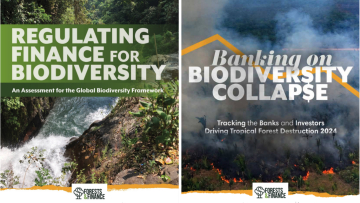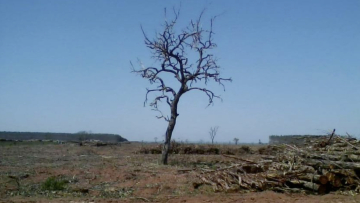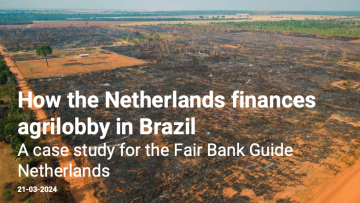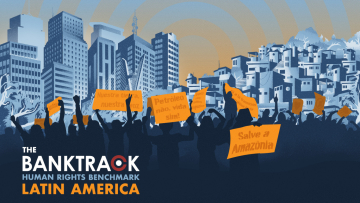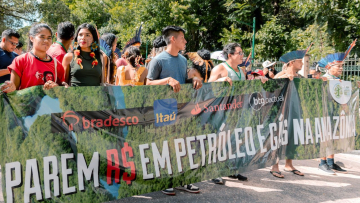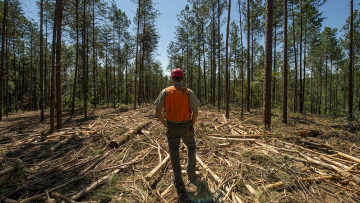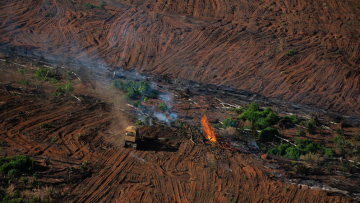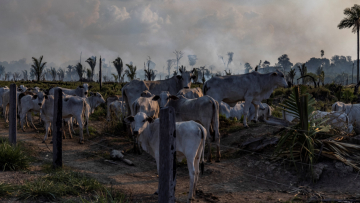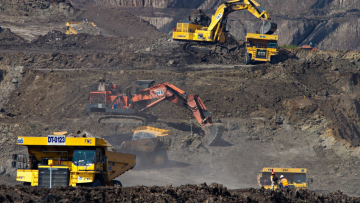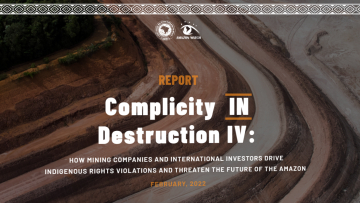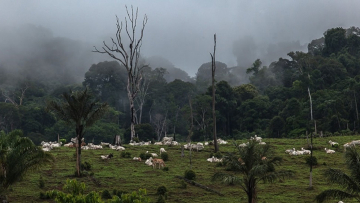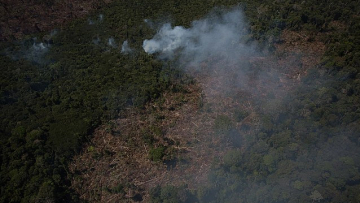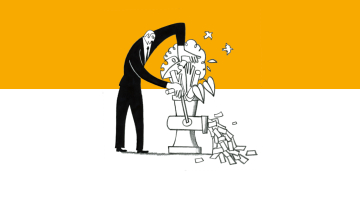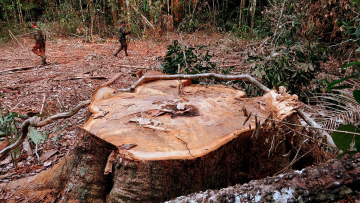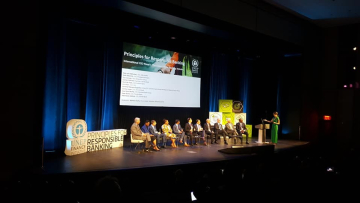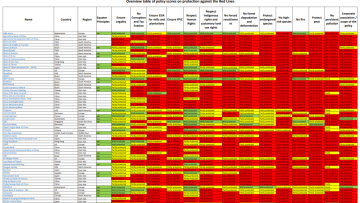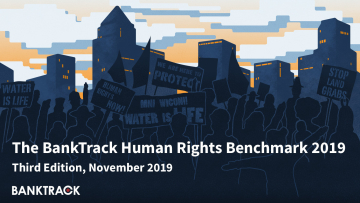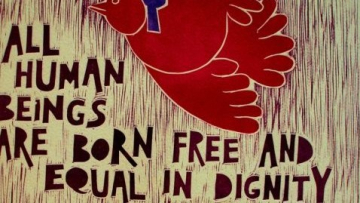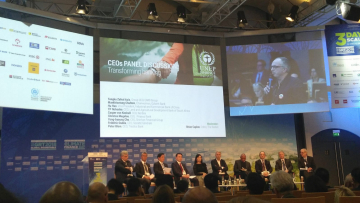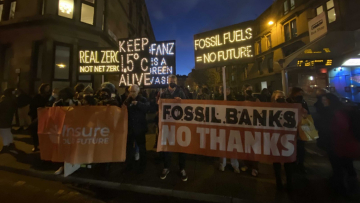
Active
This profile is actively maintained
Active
This profile is actively maintained| Website | https://www.bradescori.com.br/en/ |
| Headquarters |
Cidade de Deus, Prédio Novo, Vila Yara
06029-900 Osasco São Paulo
Brazil
|
| CEO/chair |
Octavio de Lazari Junior CEO |
| Supervisor | |
| Ownership |
listed on Bolsa de Madrid, Brazil Stock Exchange & NYSE
Banco Bradesco's shareholder structure can be accessed here. |
Banco Bradesco was established in 1943 and is one of Brazil's largest private sector bank. The bank offers a range of financial products and services to customers in Brazil and abroad. It has an extensive private-sector branch and service network in Brazil. Its products and services encompass banking operations such as loans and advances and deposit-taking, credit card issuance, purchasing consortiums, insurance, leasing, payment collection and processing, pension plans, asset management and brokerage services.
Banco Bradesco's most important sustainability commitments can be found at the website sections listed below.
Banco Bradesco is linked to a number of companies and projects that BankTrack considers controversial (so called Dodgy Deals), e.g. as a current or past financier or through an expression of interest. The profiles below provide more details on the nature of Banco Bradesco's link to these deals.
Banco Bradesco’s Corporate Reporting Channel is available to everyone, although it does not clearly state that it is open to receiving human rights related issues. Stakeholders can raise issues by sending an email to etica@bradesco.com.br or by filling in a complaint form.
Stakeholders may also raise complaints via the OECD National Contact Points (see OECD Watch guidance).
Banco Bradesco is an Equator Principles signatory. While the Equator Principles have no official grievance mechanism, complaints relating to this bank's financing of Equator Principles projects can be filed through our own website www.equator-complaints.org.
This page evaluates Banco Bradesco's responses to instances of alleged human rights violations linked to its finance, raised by civil society organisations. It is not intended to be exhaustive, but covers selected impacts raised by BankTrack and other civil society partners since 2016. For the full scoring methodology, see here. For more information about BankTrack's evaluation of bank responses to human rights impacts, see the 2021 report "Actions speak louder: assessing bank responses to human rights violations".
Banks and Climate
Partner organisation Reclaim Finance tracks the coal, oil and gas policies of financial institutions, including banks, in their Coal Policy Tool (CPT) and the Oil and Gas Policy Tracker (OGPT). BankTrack works closely with Reclaim Finance and endorses their policy assessments. Find further details on their assessment of Banco Bradesco’s fossil fuel policy below.
Banks and Human Rights
BankTrack assessed Banco Bradesco in its 2024 Global Human Rights Benchmark, where it achieved 6 points out of 15 and was ranked as a “follower”.
The bank scored 0 out of 3 points on the new “specific rights indicators”, which assess how banks address human rights defenders, Indigenous Peoples’ right to Free, Prior and Informed Consent and environmental rights in their policies and practices.
In addition, Banco Bradesco scored 0 out of 3 on how it responds to alleged human rights violations linked to its finance, which were raised by civil society organisations. More information is detailed in the “Accountability” section of this profile.
The table below shows BankTrack's assessment of how Banco Bradesco has implemented the UN Guiding Principles on Business and Human Rights. Please click on 'expand all details' and 'explanation' for further information on the methodology.
Our policy assessments are always a work in progress. We very much welcome any feedback, especially from banks included in the assessments. Please get in touch at humanrights@banktrack.org.
BankTrack assessed Bradesco in its 2024 Human Rights Benchmark Latin America, part of the series of BankTrack's Regional Benchmarks, where it achieved 6 points out of 14 and was ranked as a follower.
Human Rights Benchmark Latin America 2024
Global Human Rights Benchmark 2022
Global Human Rights Benchmark 2024
Banks and Nature
Banco Bradesco's policies for forest-risk sectors (beef, soy, palm oil, pulp and paper, rubber and timber) have been assessed by the Forests & Finance coalition, achieving an overall score of 1 out of 10 and ranking it as a follower. Banco Bradesco achieved a score of 1 out of 10 specifically for its policies related to the beef sector and 1 out of 10 for its policies related to the palm oil sector. In addition, BankTrack and the Environmental Paper Network have assessed Banco Bradesco's policies related to the pulp and paper sector.
Between 2016 and 2022, Banco Bradesco provided USD 18,583 million in credit to companies operating in these forest-risk sectors and held investments amounting to USD 58 million as of 2022. For more information, see the links below.
Forest & Finance Policy Assessment 2022: Overall scores
A bank can obtain a total of 10 points for the quality of its policies. The total score is based on their scores per sector, weighted against their financing and investment for each sector. For further details on this see here. Based on their overall score, banks are then classified as Laggards, Followers, Front runners or Leaders, as follows:
Forest & Finance Policy Assessment 2022: Beef
A bank can obtain a total of 10 points for the quality of its beef policy. The total score is based on their scores per sector, weighted against their financing and investment for each sector. For further details on this see here. Based on their overall score, banks are then classified as Laggards, Followers, Front runners or Leaders, as follows:
Forest & Finance Policy Assessment 2022: Palm Oil
A bank can obtain a total of 10 points for the quality of its palm oil policy. The total score is based on their scores per sector, weighted against their financing and investment for each sector. For further details on this see here. Based on their overall score, banks are then classified as Laggards, Followers, Front runners or Leaders, as follows:
Tracking the Net Zero Banking Alliance
Banco Bradesco is a member of the Net Zero Banking Alliance (NZBA) and has therefore committed to reduce its financed emissions to net zero by 2050; within 18 months of joining the alliance set interim targets for 2030 (or sooner) for high emission priority sectors, and within 36 months set further sector targets; set new intermediary targets every 5 years from 2030 onwards; annually publish data on emissions and progress against a transition strategy including climate-related sectoral policies; and take a robust approach to the role of offsets in transition plans. BankTrack track's implementation of these commitments in the NZBA compliance tracker.


